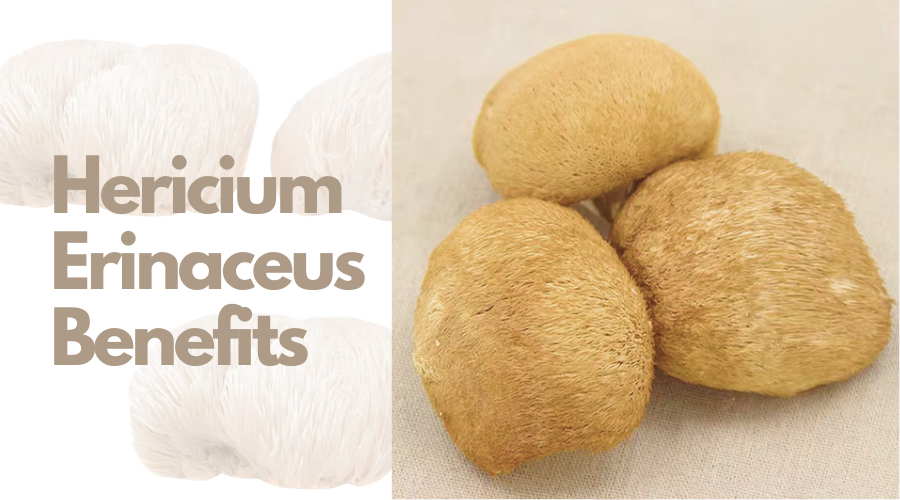
Hericium erinaceus is the Lion's mane mushroom. It is a giant greyish-white and rough mushroom with a shaggy appearance that resembles the mane of a lion. It can be taken in its raw form, cooked, dried form, or even boiled to make tea. Hericium erinaceus extracts are used for functional foods.
One of the key Hericium erinaceus benefits is its remarkable seafood-like flavor such as crab, or lobster, and it is rich in substances that have a positive impact on body organs, mainly the brain, heart, and intestines. Lion's mane mushroom is an exotic herb that has been utilized in Chinese medicine for the healing of various maladies. In this blog, we will take a closer look at how this fungi is beneficial for health, so keep reading to learn more about this amazing herb.
Neurons are capable of forming and developing new connections but become impaired as one grows older. This may explain why, in many elderly, mental performance tends to be slower or slower than before. Studies have found that Lion's mane mushrooms contain two special compounds that can stimulate brain cell growth: of which there are two classes: hericenones and erinacines. Animal research has also shown that this mushroom has assists the body to combat Alzheimer's disease, which is a progressive brain disorder that results in memory loss.
Specifically, the Hericium Erinaceus Lion's mane mushroom and its extracts were found to alleviate symptoms of dementia in mice and inhibit neurotoxicity of amyloid – beta plaques in the brain of mice.
We also saw that up to 30 percent of people living in developed countries reported having symptoms of anxiety and depression. Chronic inflammation is just one of the many causes of anxiety and depression. However, it has been found that an extract from the lion's mane can increase brain cell regeneration in mice, improving the function of the hippocampus and the area of the brain responsible for processing memories and emotions. Reducing anxiety and behaviors associated with depression is the outcome of improving hippocampal function.
The human nervous system is made up of the brain, the spinal cord, and nerves, which are distributed all over the body. They coordinate to release and transfer messages that regulate almost each and every activity of the body. Damage to the brain or spinal cord may result in paralysis or loss of mental capacity, and it will take time to heal. However, scientific studies have revealed that Lion's mane extract contributes to the enhancement of the process of regeneration of the nerves by speeding up the growth and regeneration of the nerve cells.
Indeed, Hericium Erinaceus lion's mane extract has been found to decrease rehabilitation time by 23 – 41% in rats with nervous system trauma. On a similar note, the Lion's mane mushroom extract also has the potential to lessen the severity of a stroke on the brain. In one study, when high doses of Lion's mane extract were given to rats immediately after a stroke, it resulted in drastic inflammation reduction, and this, in turn, caused a reduction in the size of the stroke-related brain injury by a third. Although no human research has been conducted to assess the impact of the Lion's mane mushroom, the evidence is still positive.
It is possible to develop sores at any point along the digestive tract extending from the stomach to the small intestine and large intestine. The following conditions usually result in stomach ulcers: a history of long-term NSAID usage that inflames the stomach mucosa and an H. pylori infection.
Lion's mane mushroom extract should be able to prevent the occurrence of gastric ulcers because it was found to suppress the growth of H. pylori bacteria and enhance the gastric mucosa barrier.
In addition, they also found that Lion's mane mushroom extract works to decrease inflammation, thus avoiding damage to other sections of the colon. They might possibly help in the treatment of inflammatory bowel conditions like Crohn's disease and ulcerative colitis. Additionally, a study conducted on individuals suffering from ulcerative colitis found that the supplement containing 14% extract from the lion's mane would improve their quality of life and reduce their symptoms after three weeks. However, more research is required to validate its impacts.
However, such factors that are likely to increase the risk of heart disease include a high body mass index level, high triglyceride levels, high levels of oxidized cholesterol and the tendency of blood clot formation. Studies also reveal that Lion's mane extract affects these factors, thus lowering the risk of heart disease.
Some experiments on rats showed that the extract of Lion's mane has the potential to enhance the fat breakdown and decrease the levels of triglycerides. Since obesity and high triglycerides are some of the factors that contribute to heart disease, this is one way through which we can be able to explain why Lion's mane is good for heart health.
Hericium Erinaceus Lion's Mane can be added to your diet or taken as a supplement to naturally improve your mood, cognitive performance, and general well-being. As with any supplement, contact a healthcare expert to determine the proper dosage and confirm it is acceptable for your specific health needs.
Shiitake mushrooms are a staple ingred...
READ FULLHealthy living requires that one follows a balanc...
READ FULLBlack fungus also known as Ear fungus ...
READ FULL